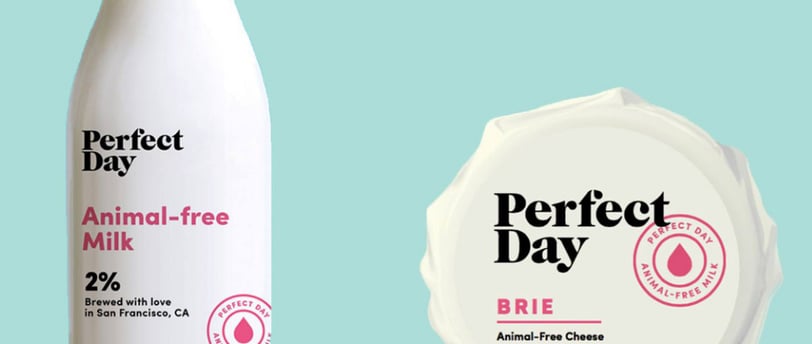The Rise of Animal-Free Dairy Products: A Sustainable and Innovative Solution for Food Businesses
In recent years, the food industry has witnessed a significant shift towards more sustainable and innovative products. Among these developments, animal-free dairy products have emerged as a promising alternative to traditional dairy. This article explores the rise of animal-free dairy, its potential environmental benefits, consumer acceptance, and how adopting these new products in your recipes could be a differential for your food business.
Felipe Saint-Martin
8/15/20243 min read


In recent years, the food industry has witnessed a significant shift towards more sustainable and innovative products. Among these developments, animal-free dairy products have emerged as a promising alternative to traditional dairy. This article explores the rise of animal-free dairy, its potential environmental benefits, consumer acceptance, and how adopting these new products in your recipes could be a differential for your food business.
What are Animal-Free Dairy Products?
Animal-free dairy products are created using precision fermentation, a cutting-edge technology that allows for the production of dairy proteins without the need for cows. This process involves using microorganisms such as bacteria and yeast to ferment plant-based substrates, resulting in proteins that are molecularly identical to those found in cow's milk.
Sustainability and Environmental Benefits
One of the primary drivers behind the development of animal-free dairy is its potential to reduce the environmental footprint of dairy production. Traditional dairy farming is a significant contributor to greenhouse gas emissions, deforestation, and water usage. By eliminating the need for livestock, animal-free dairy products can drastically cut down on these environmental impacts.
Consumer Acceptance and Preferences
As animal-free dairy products become more available, understanding consumer attitudes is crucial. While there is a segment of consumers eager to embrace these innovations, others may be hesitant due to unfamiliarity or skepticism about the taste and nutritional value. Marketing strategies that emphasize the environmental benefits and similarity in taste and texture to traditional dairy can help overcome these barriers.
Adopting Animal-Free Dairy in Your Recipes: A Differential for Your Food Business
Incorporating animal-free dairy products into your recipes can be a game-changer for your food business. By offering sustainable and innovative alternatives to traditional dairy, you can differentiate your brand and appeal to environmentally conscious consumers. Here are some ways to incorporate animal-free dairy into your recipes:
Replace Traditional Dairy with Animal-Free Alternatives: Experiment with animal-free dairy products in your recipes, such as using precision fermentation-derived milk proteins in place of traditional milk.
Create New and Innovative Products: Develop new products that showcase the unique benefits of animal-free dairy, such as vegan cheese or dairy-free ice cream.
Highlight Sustainability and Environmental Benefits: Emphasize the environmental benefits of animal-free dairy in your marketing and branding, appealing to consumers who prioritize sustainability.
Educate Consumers about Animal-Free Dairy: Provide information and resources to educate consumers about the benefits and advantages of animal-free dairy, helping to overcome any skepticism or unfamiliarity.
By adopting animal-free dairy products in your recipes, you can not only contribute to a more sustainable food industry but also differentiate your brand and appeal to a growing market of environmentally conscious consumers.
Best Brands for Dairy-Free Precision Fermentation Products
The rise of precision fermentation has led to the development of various dairy-free products that are identical to their traditional counterparts in terms of taste, texture, and nutritional value. Here are some of the best brands for dairy-free precision fermentation products:
1. Perfect Day
Perfect Day is a leading company in the precision fermentation industry, offering a range of dairy-free products such as cheese, yogurt, and ice cream. Their products are made using microorganisms that produce dairy proteins, eliminating the need for cows.
2. Remilk
Remilk is an Israeli biotech company that has developed a precision fermentation technology to produce dairy proteins. Their products include cheese, yogurt, and milk, all of which are dairy-free and identical to their traditional counterparts.
3. Imagindairy
Imagindairy is another Israeli company that uses precision fermentation to produce dairy-free products. Their products include cheese, yogurt, and milk, all of which are made using microorganisms that produce dairy proteins.
4. Vivici
Vivici is a Dutch company that has developed a precision fermentation technology to produce dairy proteins. Their products include cheese, yogurt, and milk, all of which are dairy-free and identical to their traditional counterparts.
5. New Culture
New Culture is a US-based company that uses precision fermentation to produce dairy-free products. Their products include cheese, yogurt, and milk, all of which are made using microorganisms that produce dairy proteins.
6. Formo
Formo is a German company that has developed a precision fermentation technology to produce dairy proteins. Their products include cheese, yogurt, and milk, all of which are dairy-free and identical to their traditional counterparts.
7. Bon Vivant
Bon Vivant is a French company that uses precision fermentation to produce dairy-free products. Their products include cheese, yogurt, and milk, all of which are made using microorganisms that produce dairy proteins.These brands are at the forefront of the precision fermentation industry, offering a range of dairy-free products that are identical to their traditional counterparts in terms of taste, texture, and nutritional value.
Conclusion
The rise of animal-free dairy products represents a significant advancement in the food industry, offering a sustainable and innovative alternative to traditional dairy. By understanding consumer acceptance and preferences, and incorporating these products into your recipes, you can differentiate your food business and contribute to a more sustainable future.
